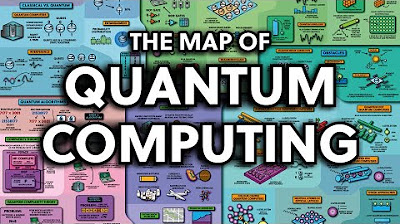Quantum Computers, Explained With Quantum Physics
Summary
TLDRThe script explores the concept of quantum computing, introduced by Richard Feynman, which uses quantum elements to simulate quantum systems. It delves into the principles of quantum mechanics, such as amplitudes and superposition, and how qubits differ from classical bits. The potential of quantum computing in solving complex problems and its challenges in measurement and algorithm design are highlighted, with an emphasis on its exciting prospects in physics.
Takeaways
- ❄️ Quantum computers operate at temperatures just above absolute zero, isolated from the rest of the universe.
- 🚀 Quantum computers promise revolutionary advancements in computation, distinct from classical supercomputers.
- 🔬 Understanding quantum computing requires a grasp of quantum mechanics, particularly the concept of amplitudes.
- 🧠 Richard Feynman proposed quantum computers to simulate quantum systems that classical computers couldn't handle.
- 🌊 Amplitudes, complex numbers different from probabilities, govern the behavior of quantum systems.
- ⚛️ Qubits, the basic units of quantum computing, exist in superposition, holding both 0 and 1 states simultaneously.
- 🔗 Quantum entanglement links qubits, creating correlations that vastly increase computational potential.
- 🎲 Measuring a quantum system collapses it into a classical state, turning amplitudes into probabilities.
- 🌐 Interference, where amplitudes add constructively, is key to designing effective quantum algorithms.
- 🔍 Despite theoretical advancements, the most impactful applications of quantum computing remain unknown and await future discovery.
Q & A
What is the primary promise of quantum computing according to the script?
-Quantum computing embodies the promise of the future with its potential to revolutionize our lives through turbo-charged computation.
How does quantum computing differ from classical computing?
-Quantum computers aren’t just the next generation of supercomputers; they operate according to the laws of quantum physics and use qubits, which can be in a state of superposition, unlike classical bits that are strictly 0 or 1.
Who first proposed the idea of a quantum computer, and why?
-Richard Feynman proposed the idea of a quantum computer because classical computers couldn't scale up to simulate quantum systems due to the exponential rise in computation cost with added particles.
What are amplitudes in quantum mechanics?
-Amplitudes in quantum mechanics are complex numbers that describe the probabilities of different outcomes. They differ from classical probabilities in that they can interfere with each other, leading to phenomena such as cancellation.
What is superposition in the context of quantum computing?
-Superposition is a state where a qubit can simultaneously hold a combination of 0 and 1, allowing quantum computers to process a vast amount of data compared to classical computers.
What is quantum entanglement?
-Quantum entanglement is a phenomenon where qubits in a superposition state are mathematically related, such that the state of one qubit is directly connected to the state of another, regardless of the distance between them.
Why is it challenging to simulate highly entangled states with classical computers?
-Simulating highly entangled states with classical computers is extremely expensive because the amount of classical bits needed grows exponentially. For instance, a 500-qubit system would require more classical bits than there are atoms in the known universe.
What happens to a quantum system when it is measured?
-When a quantum system is measured, it collapses into a classical state, meaning that the qubits lose their superposition and become either 0 or 1.
How do scientists harness interference in quantum computing?
-Scientists harness interference by creating a deterministic sequence of qubit gates that cause amplitudes to add up constructively, thereby boosting the probability of obtaining the correct answer.
What are some potential applications of quantum computing mentioned in the script?
-Potential applications of quantum computing include fields such as cybersecurity and search optimization, but its most significant use is expected to be in exploring and understanding the deep structure of our world.
Why is designing quantum algorithms considered difficult?
-Designing quantum algorithms is difficult because it requires ensuring that amplitudes add up constructively to increase the probability of the correct answer, which is challenging without knowing the right answer in advance.
Outlines

此内容仅限付费用户访问。 请升级后访问。
立即升级Mindmap

此内容仅限付费用户访问。 请升级后访问。
立即升级Keywords

此内容仅限付费用户访问。 请升级后访问。
立即升级Highlights

此内容仅限付费用户访问。 请升级后访问。
立即升级Transcripts

此内容仅限付费用户访问。 请升级后访问。
立即升级浏览更多相关视频

క్వాంటం సైన్స్ తో కంప్యూటర్ విప్లవం ఎలా ? || Computer Revoluation With Quantam Science ||

Computação Quântica - Fundamentos e Aplicações - Aula 03

Redes - El ordenador del futuro - Ordenadores cuánticos

What can Schrödinger's cat teach us about quantum mechanics? - Josh Samani

Quantum Computing - The Foundation of Everything - Part 1 - Extra History

The Map of Quantum Computing - Quantum Computing Explained
5.0 / 5 (0 votes)
